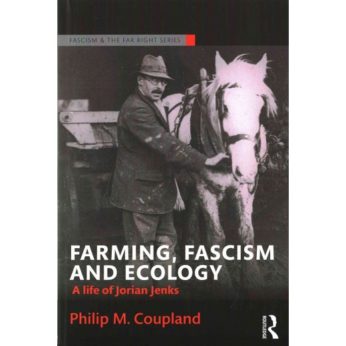
Born in 1899 to a middle-class English family espousing liberal politics, Oxford graduate Jorian Jenks bucked tradition. From an early age, all he ever wanted to be was a farmer.
Managing to realize this dream in his thirties, he eventually lost his farm due to the bleak economic climate of the period.
But work on land reclamation in New Zealand, positions in teaching and research, and a lifelong career in agricultural journalism meant that his life remained connected with his love of the land and the people who work on it.
As Philip M Coupland’s new biography makes clear, Jenks’ insistence on the importance of ongoing scientific experimentation may well have marked him out from more complacent colleagues, even though he himself initially adopted a fairly conventional approach.
His advocating the benefits of using chemical fertilizers and creating much larger factory-style farms that could avoid the “cabbage patch” poverty of landholding was hardly unorthodox.
In later years, he argued for small and medium-sized family farms, based on mixed husbandry and the intensive use of labor from people and his much-loved horses, to the extent that one reviewer said that his world rarely seemed to acknowledge the invention of the internal combustion engine.
Concerns about the effects chemicals were having on the soil, and the related need to produce healthy and wholesome food, later led to him being lauded as one of the founders of the massively important organic movement. His involvement in Britain’s Rural Reconstruction group and the Soil Association, which developed the world’s first organic food certification system, was crucial.
For the mild-mannered and contemplative Middle Englander, this was very much a life of achievement – all the more so because his own needs and ambitions had always been fairly limited and modest.
But what surprises many about Jenks is that he had been an active member of the British Union of Fascists, stood as a candidate for the party on a number of occasions, and was its agricultural correspondent. He penned numerous articles for the fascist weekly newspaper Action and wrote books such as Spring Comes Again, which made no secret of his commitment to racist and anti-Semitic politics.
Interned during the war as a result, on release Jenks maintained links with the Blackshirts’ reincarnation in the form of Oswald Mosley’s Union Movement and never disavowed his fascism.
This may come as a shock to those who associate green ideas with libertarian and emancipatory politics. But “blood and soil” nationalists and Catholic-based Distributists such as Hilaire Belloc and G.K. Chesterton had for a long time sought to create a craft and agrarian-based economy in which family and guild-based forms of production played a primary role.
Jenks’ political trajectory was by no means unique within the intelligentsia either, with Henry Williamson, Ezra Pound, and Wyndham Lewis all having been happy to associate with the fascist cause.
At times, Coupland underplays the threat that fascism posed and appears to view the campaign against his subject, often orchestrated by the Communist Party-affiliated newspaper Daily Worker, as something of a witch-hunt.
But his comprehensive and insightful work is far more important than a mere biography of a right-wing eccentric, particularly in shedding light on the problematic relationship between ecological and fascist movements, a much contested debate to say the least.
Farming, Fascism, and Ecology: A Life of Jorian Jenks
by Philip M Coupland
Routledge, $59.95
This review originally appeared in Morning Star.










